“How to Bring Your Best Every Day”, Interview, Ben S. Fogel, RKC, Former World Cup Bobsledder
By Adrienne Harvey, SrPCC, RKC-II, CK-FMS
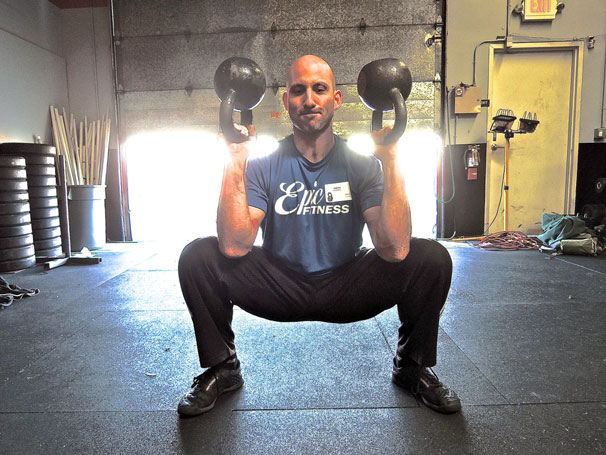
Dragon Door: You have a varied and very accomplished athletic background including javelin and bobsled—how did you get started in athletics?
Ben Fogel: I only competed in track and field for one year in high school. Before that I played basketball, soccer and even a little bit of golf. But, I didn’t really know what I wanted to do in athletics. During my junior year, I was just riding the bench because on the varsity team, the seniors got all the playing time.
I asked my father, who threw the discus in college, what else I could do to challenge myself and make my own destiny with athletics. He said that if you are throwing the farthest, or running the fastest in track and field, then they won't bench you. This gave me a goal. I stopped playing basketball after my junior year, and started to train for track and field the summer prior to my senior year of high school.
My very first track and field coach at Nevada Union High school in Northern California, was Dick Hotchkiss. He was a former Olympic Trials Qualifier in the Javelin in 1968 and is a multiple current and former world record holder in the weight pentathlon as well as shot put and hammer throw—and I didn't even know it back then! I was training with one of the best in the world, and he was still throwing world records at that time.
Between my junior and senior year in high school, I gained about thirty pounds and became a thrower. I decided to follow in my father's footsteps by going to the college of San Mateo, where I had the opportunity to train with another great track and field coach, Mike Lewis. He's well known in the throwing community, and helped coach many Olympians and Olympic hopefuls.
I came into a training environment of Olympic caliber throwers in 1998-99—also just my second year in track and field—and was training alongside guys who were throwing almost close to 200 feet in the discus. I had to up my game very quickly! I started throwing javelin, and in my first year was throwing it almost 190 feet. By my second year I broke the school record in the Javelin at 211’2" and that gave me an opportunity to compete in track and field on a Division 1 level.
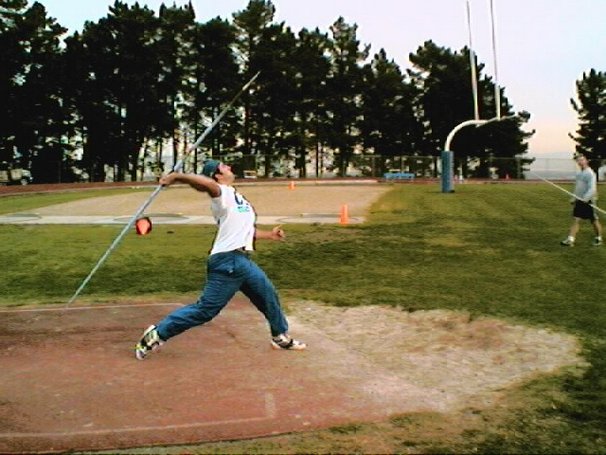
I received a scholarship to Cal Poly, San Luis Obisopo for track and field as a two event guy (discus and javelin), but the following year, I overdid it. I was throwing javelin too much and needed orthoscopic surgery on my right elbow. I never threw any farther than in junior college, but did well enough to keep throwing at an elite level. I still wanted to compete more after college, but knew that I wouldn’t be able to perform at an elite level anymore in track and field. Since I would be graduating with a degree in exercise science, I could either go into the workforce or hold off and compete in something else.
Sheldon Blockburger, the decathlete coach at Cal Poly, let me run, sprint, and jump with his group of decathletes. He noticed that I was running pretty fast compared to his decathletes, so he suggested that I try bobsled. Sheldon was a world class, elite level decathlete back in the Dan and Dave decathlon days of the late 80’s and early 90’s. So, his advice went a long way with me in 2003 when he suggested that I try out for bobsled.
The 2002 Winter Olympic Games were huge for men’s bobsled because the United States took silver and bronze in the 4-man bobsled event. Then about 80% of the guys from that year retired, and the US Bobsled Team did an athlete recruitment tour in the spring of 2003. The recruitment tour went all over the country and came to Long Beach for a weekend in May. I had six weeks to prepare.
The four item test included a 60-meter sprint timed at 30 meters and 60 meters, a 30 meter fly from 30 to 60, a vertical jump, and a five hop test (five broad jumps in a row for distance). I did well enough with the testing, I got called back to try out for the team in Lake Placid—and to learn how to push a bobsled! I graduated from Cal Poly, finished my internship requirements, then took the next plane to Lake Placid.
After learning how to push a bobsled, I was good enough my first year to make the US national team as an alternate. I learned a lot about the sport my first year and I got to travel with the team internationally. In 2003-2004, the world championships were in Konigsee, Germany and I got to be with the team but not compete (because I was an alternate).
The following year, 2004-2005, I decided that I needed to live and train with all the Olympic hopefuls. Stewart McMillan, my bobsled strength coach, was Canadian and worked with the US National Team during my time in the sport. I moved to Calgary and trained there for the next two years leading up to the 2006 Winter Olympic Games.
In 2004-2005, I trained with Steve Holcomb (the 2010 gold medalist) as his brakeman. We actually took him to his best finish in 2005 and were ranked in the top 10 leading up to the world championship. That year, we took 8th place at the world championships which helped me progress to a level where I became sponsored though the Olympic Job Opportunity Program with Home Depot. This allowed me to work and live in Calgary—and earn a wage—while training and representing the United States.
I slid for most of that year on a world cup level leading up to the Olympic Games in 2006. That year in 4-man bobsled, they tested many different combinations with the brakemen and the other guys pushing the sled. I ended up not making the cut. So after 2006, I had to figure out if I wanted to continue to bobsled. I felt like I had "enough in the tank" to continue, so I kept training through the 2009 season, and competed at the World Cup level from 2007-2008 through 2009. I also started my personal training business in 2007, which was taking off to the point where I couldn’t travel as much.
I had really enjoyed the six years of traveling all over the world. Competing at that level put perspective into my own training, and I learned a lot about myself. No one really comes from a bobsled background—but because of the training that I had with excellent coaches in high school and college, I was able to come in at a very high level. Now that I’m a coach and running a
personal training business, it's my turn to give back to my members as well as to my coaches.
Actually, my goal is to be the "worst" coach at my gym! We have four coaches at my gym and if I'm really the worst one on the gym floor, then that’s a testament to how we coach and train our coaches.
Dragon Door: You mentioned learning a great deal about yourself when you were competing internationally. What do you think was the biggest lesson from that time?
Ben Fogel: In bobsled, I learned really quickly that people noticed when I showed up every day on time (or early), brought my best, did what was asked of me at a high level, and practiced and trained every day. Back in 2005, I was kind of fighting for my life with bobsled—it was a cutthroat pre-Olympic year. Ten guys behind me wanted to be on that bobsled. There’s a lot of competition at that level for getting sponsorships, as well as getting a chance to compete in the Olympic Games. Even though I was taken off of a sled in the middle of the season and told I wasn’t fast or strong enough, I didn't believe it and kept training at a high level back in Calgary.
The coaches came back from Europe in disarray because the team wasn’t a good match. They noticed that I was doing really well and had been training my butt off, so they gave me the opportunity to compete in a race-off to get back my position on the sled for the 2005 World Championships.
That really taught me to never give up, to show up every day, and bring my best each and every time. Most people don’t understand that it requires little to no talent to build these habits. More than ten years later, I’m still rewarded by having a thriving fitness business. I’m instilling this mindset and culture with my team at the gym, and it works because I show up and bring my best every day.
Dragon Door: That concept is so universal, it’s true in athletics, fitness, fat loss, business, playing a musical instrument…
Ben Fogel: If I had worked my tail off and still not made it back on the team for the world championship race, that would have been ok because I would have known I did my best. But if I hadn’t tried, what would I be thinking now? I don't want to be in the position of saying I could have done this, or should have done that.
Dragon Door: How did you get into kettlebells?
Ben Fogel: I was working at a facility that had
kettlebells in 2007. I wanted to know why there was a handle on a ball, so someone showed me a "squatty" kettlebell swing. I started doing squatty swings, and I thought it didn't feel right. I did some self-study and found Pavel's books. Years later, when I learned that
Dan John was in Salt Lake, I knew I had to train with him. He taught me the finer aspects of the swing and goblet squat about a year ago.
Since then, Dan has really taught me how to get stronger, faster hips and an athletic body with basic kettlebell movements. Past the basics, I learned a lot of little things over the weekend at the RKC.
Dragon Door: What brought you to the recent RKC in San Jose?
Ben Fogel: About 5-6 weeks before the
RKC, Dan John asked if I wanted to go and said that he would be coaching at the workshop. I knew I would love the opportunity, then saw that
Dr. Chris Holder, Master RKC would also be coaching. Chris was my strength coach for three years at Cal Poly, and was a big influence in my training. I did my first coaching internship with him in the Cal Poly Athletic weight room. This was even before he brought in kettlebells!
I read an interview years later in 2005-2006 with one of Chris Holder’s former football athletes, Chris Gocong. He had about an eight-year career in the NFL, and said that the biggest contribution to his success and staying healthy throughout his career was kettlebell training! I kept hearing about kettlebells, so when I had the opportunity to train with Dan John, I jumped on it.
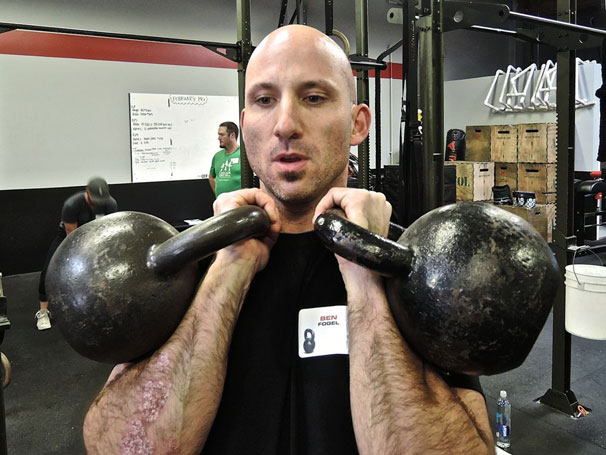
Dragon Door: What’s one of the most powerful things that you learned at the RKC?
Ben Fogel: A lot of the concepts they were teaching were powerful. Dan John’s idea idea of "Being a slave to good habits", and the concept of "being a professional" came up again and again. If you don't set the kettlebell down like a pro at the end of your five-minute snatch test, then you fail the test! Just this morning, we were teaching our clients to pick up and set down their kettlebells like "professionals". We weren't really pushing that idea before, but those little things go a long way. If the coaches are doing it, then the clients will follow along.
We also learned about central nervous system work and program design ideas that I will test and potentially use at our gym. It’s important to meet your clients where they are—no matter how perfect you think your program is, it might not be the best thing for them on a particular day. We learned that one way to determine a client’s readiness is to use a grip dynamometer to test their neurological strength.
It’s really important to find a baseline daily, so when our clients come to the gym, the dynamometer test just takes 5-10 seconds. If we find that a client’s grip is toast, their neurological signs are down and we will have to lay off. We might change the load or rep scheme, or otherwise adjust the workout based on the neurological demand currently affecting their body.
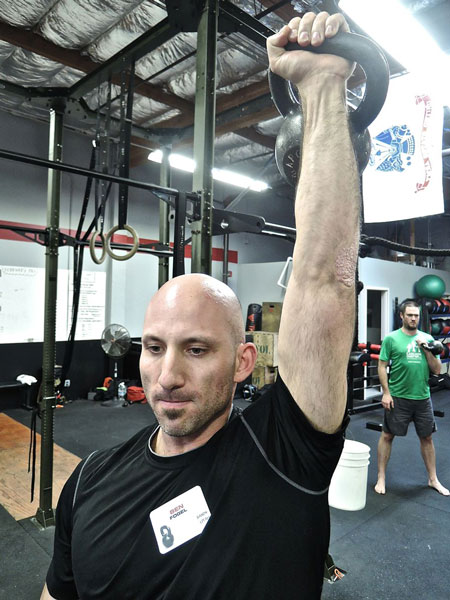
Chris Holder spoke about the SAID principle—specific adaptations to imposed demands. Even something as simple as a kettlebell swing or kettlebell deadlift with slightly imperfect form will cause the body to adapt to those conditions. The "squatty" swings I was trying back in 2007 would have caused a rounded back, and contributed to poor posture.
Teaching
proper kettlebell swing form is especially important since 90% of our clients are desk jockeys. If they're at their desk all day, they need to be using the powerhouse engine of their hips, with minimal spine movement.
There was so much at the RKC that I brought back to our gym, so many teaching cues and just so much information.
Dragon Door: Now that you’ve earned your RKC certification, what’s your next goal?
Ben Fogel: My wife Amy and I have and two boys, Dean is three and a half, and Roman just turned two. Amy is just amazing, but I realized that the boys are growing up really fast, and I want to spend a lot more time with them. I am in the process of systemizing everything at our gym—the business, program design, and coaching.
If I meet my goal of being the "worst" coach on the floor, that will mean that the systems and culture at our gym is working. I want to spend more time teaching my coaches everything I have learned in the trenches for over 10 years in the industry, and to spend more time with my family.
While I thought about making another run for bobsled, it would mean being away from my family for 3-5 months at a time. I'm 36 and feel like I can still compete at a high level, but I've taken 5 or 6 years off from being an elite, competitive athlete, and it feels good not have that pressure. But I also feel like I want to throw again and be in a competitive environment again. In the spring, I’m going to throw the discus and see what happens.
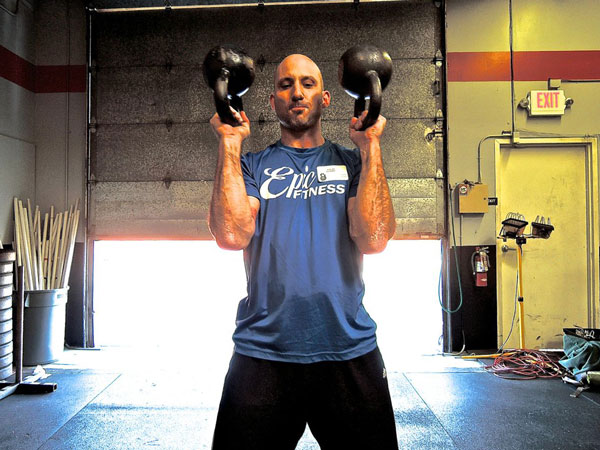
Even though I've taken more than 10,000 throws in the discus, I’m looking forward to relearning it with new teaching tools like the kettlebell and the powerful hip movements required for kettlebell swings. I know of an outstanding coach who lives nearby, hopefully I can get him out there and have some fun in the spring.
Dragon Door: How do you think your experience as a competitive athlete has helped you as a coach and with your personal training business?
Ben Fogel: I probably had a larger ego than necessary when I was a competitive athlete, but thought I needed it to compete at a high level. But I learned that it actually gets in the way of most everything in life. And now, looking back at it through a coach's eyes, I can see that without that ego, our clients, and our team at the gym can better relate to me. Now, that I’ve taken my ego out of it completely, I wish I hadn’t had those hard rough edges years ago. I wasn’t enjoying myself the way that I am now!
Now, I want to give the community of people I serve one common goal, which is to get better each day they come in to the gym. We want to make sure that we're following our clients along the path of their own goals, and not directing them somewhere they don’t want to go.
Something Dan John brought up at the RKC was his "theory of twos". He said it best by asking the following questions, "Where do you want to be in two decades, two years, two weeks, two days… and where do you want to be tomorrow? And are we getting better today?"
Back